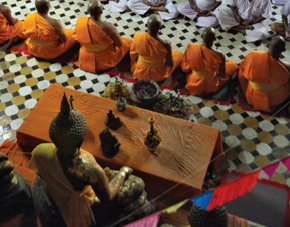สารบัญ
5. Reflection (Paccavekkhana)
Being reflective means being attentive to details. Such a quality is important for all of those who wish to progress in both the physical and spiritual world. If a person goes about their life half-heartedly, never applying themselves fully, they cannot expect to succeed in life. However, those who are diligent and who follow througlไ with their commitments will find happiness and thrive no matter where life takes them.
How does one become reflective?
Lord Buddha encouraged his disciples to value the life's four basic requisites-the four basic needs being food, shelter, clothing and medicine.
Since we live in the physical world, we tend to think of the four basic requisites only in physical terms, for example food. We often think only whether or not it is clean, tasty, nutritious or healthy. This is all most of us think about when it comes to food, but this is not enough. If we think only in this manner, then we utilize our mind merely at the amateur level.
The act of becoming a person who is reflective involves three phases.
1. You must be conscious and aware. You must learn how to accept things from people with gratitude and not out of greed. Otherwise, you will ruin your reputation as a monk. You must learn how to be gracious in receiving alms. For example, when you seek alms, and your bowl is almost full, you must learn when to say enough is enough. Alternatively, after you finish your second plateful, if someone tries to offer you more food, you must learn how to decline politely. This applies to any offering to you as a monk that does not go towards meeting either your needs, or helping in furthering your study of the Dhamma. As a monk, you are not supposed to have more than you need.
2. You must be deliberate and perceptive. For example, when you are eating, you must recognize that you are eating for energy so that you may have the strength to study the Dhamma, and not for the fact that the food will improve your appearance, or whether it is tasty or not. Even your robes and your living quarters, the same principles should be applied. Those items exist not for your comfort, but to meet your basic needs so that you may further your study of the Buddha's teachings.
3. You must be reflective. Once you have finished consuming your meal, and have energy, you must ask yourself whether you have used the strength gained from your meal to focus on learning the Dhamma. If not, then you have not conducted yourself in a manner befitting the layman's act of merit making. The more you reflect on this, the more you will come to understand and appreciate your responsibilities as a monk. Afterwards, you will grow to be reflective of all your actions.
The Benefits of Mindfulness
Reflection helps us to be a person who is attentive and diligent. Such a person is one who possesses clarity of mind, self-restraint and who does not suffer from the affliction of greed. The more you practice reflection, the more you will have self-awareness. Your sense of perception will improve along with your ability to judge other peoples' character with greater precision





